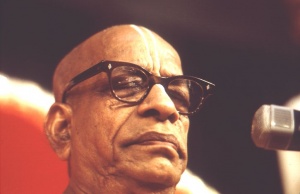CC Adi 13.1 (1975): Difference between revisions
(Created page with "C001 <div style="float:left">'''Śrī Caitanya-caritāmṛta (1975) - CC...") |
(Vanibot #0020: VersionCompareLinker - added a link to the Version Compare feature) |
||
| Line 2: | Line 2: | ||
<div style="float:left">'''[[Sri Caitanya-caritamrta (1975)|Śrī Caitanya-caritāmṛta (1975)]] - [[CC Adi (1975)|Ādi-līlā]] - [[CC Adi 13 (1975)|Chapter 13: The Advent of Lord Śrī Caitanya Mahāprabhu]]'''</div> | <div style="float:left">'''[[Sri Caitanya-caritamrta (1975)|Śrī Caitanya-caritāmṛta (1975)]] - [[CC Adi (1975)|Ādi-līlā]] - [[CC Adi 13 (1975)|Chapter 13: The Advent of Lord Śrī Caitanya Mahāprabhu]]'''</div> | ||
<div style="float:right">[[File:Go-previous.png|link=CC Adi 13 (1975) Summary|Chapter 13 Summary]] '''[[CC Adi 13 (1975) Summary|Chapter 13 Summary]] - [[CC Adi 13.2 (1975)|Ādi-līlā 13.2]]''' [[File:Go-next.png|link=CC Adi 13.2 (1975)|Ādi-līlā 13.2]]</div> | <div style="float:right">[[File:Go-previous.png|link=CC Adi 13 (1975) Summary|Chapter 13 Summary]] '''[[CC Adi 13 (1975) Summary|Chapter 13 Summary]] - [[CC Adi 13.2 (1975)|Ādi-līlā 13.2]]''' [[File:Go-next.png|link=CC Adi 13.2 (1975)|Ādi-līlā 13.2]]</div> | ||
{{CompareVersions|CC|Adi 13.1|CC 1975|CC 1996}} | |||
{{RandomImage}} | {{RandomImage}} | ||
==== TEXT 1 ==== | |||
<div class="verse"> | |||
:sa prasīdatu caitanya- | |||
:devo yasya prasādataḥ | |||
:tal-līlā-varṇane yogyaḥ | |||
:sadyaḥ syād adhamo 'py ayam | |||
</div> | |||
==== SYNONYMS ==== | |||
< | <div class="synonyms"> | ||
saḥ—He; prasīdatu—may bestow His blessings; caitanya-devaḥ—Lord Śrī Caitanya Mahāprabhu; yasya—of whom; prasādataḥ—by the grace; tat-līlā—His pastimes; varṇane—in the description; yogyaḥ—able; sadyaḥ—immediately; syāt—becomes possible; adhamaḥ—the most fallen; api—although; ayam—I am. | |||
</div> | |||
==== TRANSLATION ==== | |||
<div class="translation"> | |||
I wish the grace of Lord Caitanya Mahāprabhu, by whose mercy even one who is fallen can describe the pastimes of the Lord. | |||
</div> | |||
==== PURPORT ==== | |||
<div class="purport"> | |||
To describe Śrī Caitanya Mahāprabhu or Lord Śrī Kṛṣṇa, one needs supernatural power, which is the grace and mercy of the Lord. Without this grace and mercy, one cannot compose transcendental literature. By dint of the grace of the Lord, however, even one who is unfit for a literary career can describe wonderful transcendental topics. Description of Kṛṣṇa is possible for one who is empowered. Kṛṣṇa-śakti vinā nahe tāra pravartana ([[CC Antya 7.11 (1975)|Cc. Antya 7.11]]). Unless endowed with the mercy of the Lord, one cannot preach of the Lord's name, fame, quality, form, entourage and so on. It should be concluded, therefore, that the description of Caitanya-caritāmṛta by Kṛṣṇadāsa Kavirāja Gosvāmī manifests specific mercy bestowed upon the author, although he thought of himself as the most fallen. We should not consider him fallen because he describes himself as such. Rather, anyone who is able to compose such transcendental literature is our esteemed master. | |||
</div> | |||
Latest revision as of 15:00, 26 January 2020

A.C. Bhaktivedanta Swami Prabhupada
TEXT 1
- sa prasīdatu caitanya-
- devo yasya prasādataḥ
- tal-līlā-varṇane yogyaḥ
- sadyaḥ syād adhamo 'py ayam
SYNONYMS
saḥ—He; prasīdatu—may bestow His blessings; caitanya-devaḥ—Lord Śrī Caitanya Mahāprabhu; yasya—of whom; prasādataḥ—by the grace; tat-līlā—His pastimes; varṇane—in the description; yogyaḥ—able; sadyaḥ—immediately; syāt—becomes possible; adhamaḥ—the most fallen; api—although; ayam—I am.
TRANSLATION
I wish the grace of Lord Caitanya Mahāprabhu, by whose mercy even one who is fallen can describe the pastimes of the Lord.
PURPORT
To describe Śrī Caitanya Mahāprabhu or Lord Śrī Kṛṣṇa, one needs supernatural power, which is the grace and mercy of the Lord. Without this grace and mercy, one cannot compose transcendental literature. By dint of the grace of the Lord, however, even one who is unfit for a literary career can describe wonderful transcendental topics. Description of Kṛṣṇa is possible for one who is empowered. Kṛṣṇa-śakti vinā nahe tāra pravartana (Cc. Antya 7.11). Unless endowed with the mercy of the Lord, one cannot preach of the Lord's name, fame, quality, form, entourage and so on. It should be concluded, therefore, that the description of Caitanya-caritāmṛta by Kṛṣṇadāsa Kavirāja Gosvāmī manifests specific mercy bestowed upon the author, although he thought of himself as the most fallen. We should not consider him fallen because he describes himself as such. Rather, anyone who is able to compose such transcendental literature is our esteemed master.